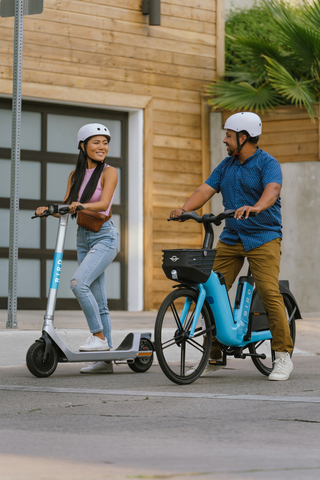New Data Reveals Environmental and Economic Benefits of Bird’s Micro Electric Vehicle Service
Bird Global, Inc. (NYSE:BRDS), a leader in environmentally friendly electric transportation, today released new data revealing that Bird riders contributed an estimated $100 million in incremental spending at local businesses in 2021 as a result of access to micromobility. Together, these riders also helped save an estimated 1.1 million gallons of gasoline by opting for eco-friendly transportation over gas-powered cars this year alone.
This press release features multimedia. View the full release here: https://www.businesswire.com/news/home/20211216005204/en/

Latest Estimates Indicate Bird Shared Micro-Electric Vehicles Pump $100M into Cities Worldwide and Save 1.1M Gallons of Gasoline in 2021 (Photo: Business Wire)
“Bird was founded to make cities more livable for all,” said Travis VanderZanden, Founder and CEO of Bird. “While we continue to make measurable progress toward our goal of reducing reliance on carbon emitting transportation such as gas-powered cars, it is remarkable to also see the positive impact our riders are having on local economies, specifically, local businesses that were very heavily impacted by the global pandemic. We are grateful to all who chose eco-friendly transportation in 2021 and look forward to continuing this positive trend in 2022 as cities increase adoption of micromobility and support expanded services with our shared bikes and scooters.”
The new data shows Bird riders saved an estimated 1,125,000 gallons of gasoline, about two Olympic-sized swimming pools, from being burned in 2021. According to the methodology published by the Arbor Day Foundation, the environmental impact of the modeshift in behaviors is comparable to the amount of CO2 absorbed by nearly 460,000 mature trees in one year. The data from Bird complements a July 2021 survey from the McKinsey Center for Future Mobility, which found that nearly 70% of respondents were willing to use micromobility to commute to work, further demonstrating that people are shifting toward smaller and more sustainable transportation options for their everyday needs.
Bird’s micro-electric vehicles also had a significant economic impact in the more than 350 cities that it serves globally, especially as cities worked to support their local businesses. Conservative estimates show that Bird scooters added more than $100 million in incremental spending, predominantly at local food and beverage companies, across its partner cities in 2021. According to a six-month study from Emory University’s Goizueta School of Business, each deployed scooter in a city spurs a given amount of additional incremental spending relative to cities of comparable size that do not offer this type of micromobility option.
“All the data points to the same conclusion: e-scooters drive consumer spending and likely provide a significant financial boon to local economies,” said Assistant Professor of Marketing Daniel McCarthy, who co-authored the study along with Emory University PhD student Kyeongbin Kim. “Obviously cities have many factors to consider when choosing to partner with Bird or others in the micromobility industry, but the economic benefit to local businesses should not be understated.”
Beyond the environmental and economic impacts, 2021 was a milestone year for Bird and the broader micromobility industry. Other notable data and trends from 2021 include:
- The Thousand Ride Club. Around the world, riders relied on Bird for thousands of trips in their home cities. The top five Bird riders globally, hailing from Austin, Lisbon, Rome, San Jose and Madrid, combined have taken more than 20,000 trips in 2021 or on average 5,000 trips per person.
- Going the distance. The launch of Bird Three in 2021, with its increased battery capacity, has enabled longer rides than ever before. On September 7, a rider in Munich, Germany, took their Bird Three to the limit, covering 28.5 miles on a ride that lasted 2 hours and 48 minutes. This was just over one tenth of a mile longer than a Bird Three rider in Tampa, Florida, who rode 28.4 miles on October 10, during a trip that lasted 2 hours and 39 minutes.
- Extending the trend. The average Bird ride length reached a new record high in 2021. It’s now 58% longer worldwide when compared to 2019 as riders continue the trend of leveraging micromobility for longer and more varied trips.
- Bridging the gender gap. An increase in women’s scooter ridership emerged in 2021, particularly in the southern United States. In Memphis, 41% of riders in 2021 identified as female, while in Atlanta, that number is nearly 46%. The trend is also present in smaller cities such as Yuma, Arizona, where 42% of riders in 2021 identified as female.
About Bird
Bird is an electric vehicle company dedicated to bringing affordable, environmentally friendly transportation solutions such as e-scooters and e-bikes to communities across the world. Founded in 2017 by transportation pioneer Travis VanderZanden, Bird is rapidly expanding. Today, it provides fleets of shared micro electric vehicles to riders in more than 350 cities globally and makes its products available for purchase at www.bird.co and via leading retailers and distribution partners. Bird partners closely with the cities in which it operates to provide a reliable and affordable transportation option for people who live and work there.
View source version on businesswire.com: https://www.businesswire.com/news/home/20211216005204/en/
Contacts
Investor
Andrew Tom
investor@bird.co
Media
Rebecca Hahn
press@bird.co